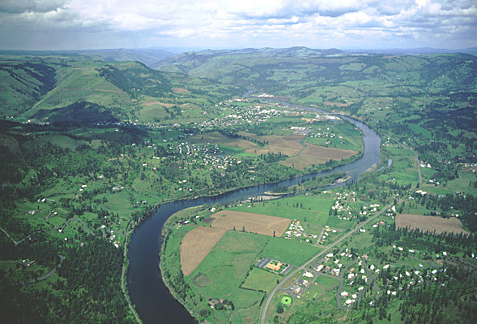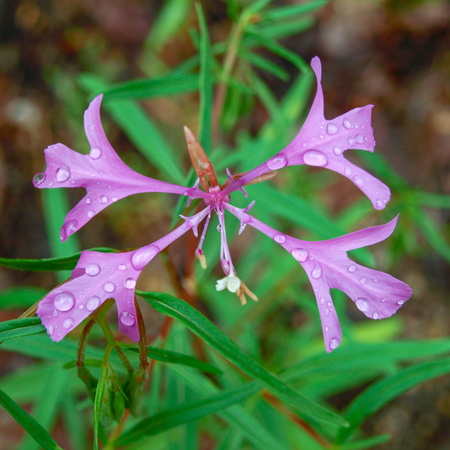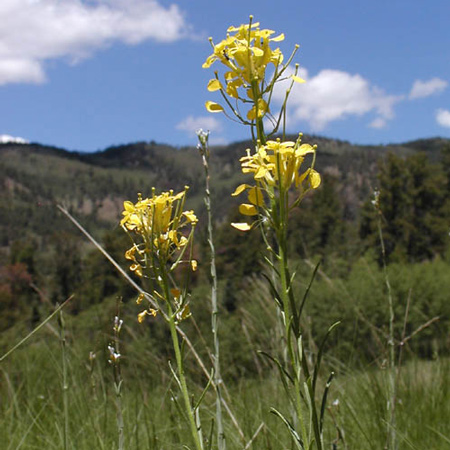Sgt. Ordway and two privates near Long Camp with their cargo of salmon and Charbonneau and Lepage return from a “broken voyage.” Clark mentions a plan to divide forces after reaching Travelers’ Rest, and Drouillard is sent to find Nez Perce men to guide them. Lewis discusses the Clarkia flower (Clarkia pulchella) and prepares two more plant specimens.
Trading Goods and Services
by Yellowstone Public Radio[1]Originally aired weekdays by Yellowstone Public Radio during the Bicentennial observance of 2003-2006. Narrated by Hal Hansen. Scripts by Whit Hansen and Ed Jacobson. Produced by Leni Holliman. © … Continue reading
Kamiah Valley
View Northwest
To see labels, point to the image.
© 2001 Airphoto, Jim Wark. All rights reserved.
Seeking a Shorter Way Home
we desired Drewyer to make Some enquiry after the Twisted hair; the old man has not been as good as his word with respect to encamping near us, and we fear we Shall be at a loss to procure guides to conduct us by the different routs we wish to pursue from Travillers rest to the waters of the Missouri.—.
—William Clark
Ragged Robin (Elkhorn)
Clarkia pulchella
Fish Creek below Hungery Creek, 6 June 2009. © by Kristopher K. Townsend. Permission to use granted under the Creative Commons Attribution-Share Alike 4.0 International license.
Clarkia, Elkhorn, or Ragged Robin
I met with a singular plant today in blume of which I preserved a specemine; it grows on the steep sides of the fertile hills near this place . . . . I regret very much that the seed of this plant are not yet ripe and it is proble will not be so during my residence in this neighbourhood.—
—Meriwether Lewis
Ordway Nears Long Camp
towards evening we came down the river hills to a large village above the forks on kooskooskee river. we halted a Short time to let our horses feed a little and git something to eat ourselves. bought considerable uppah and couse [cous root] from the natives and proceeded on to another village down the river near the forks. night came on and we Camped here at the chiefs lodge that gave us so many horses
—John Ordway
Charbonneau and Lepage’s Broken Trip
Yesterday evening Charbono [Charbonneau] an LaPage [Lepage] returned, having made a broken voyage . . . . the river having fallen heir to both merchandize and roots, our traders returned with empty bags.
—Meriwether Lewis
Rough Wallflower
On the Kooskooskee Jun. 1st 1806.
—Meriwether Lewis[2]Erysimum asperum. Moulton, ed. Herbarium, specimen 64.
Black Cottonwood
Cotton tree of the Columbia River. Jun: 1806.
—Meriwether Lewis[3]Populus balsamfera trichocarpa (P. trichocarpa, Torr. & Gr.). Ibid., specimen 138.
Weather Diary
State of the weather at rise
Wind at rise
State of the weather at 4 P.M. Wind at 4 P.M. State of the Kooskooskee at rise
fair after rain, thunder, & lightning S E fair after cloudy N W raised 1 ft. 6 in. about dark last evening had a slight rain from a heavy thunder cloud which passed to the E & N. E. of us.
—Meriwether Lewis[4]To assist the reader of this web page, the date column is not presented, the river columns have been merged, and some abbreviations have been spelled out.
Experience the Lewis and Clark Trail
The Lewis and Clark Trail Experience—our sister site at lewisandclark.travel—connects the world to people and places on the Lewis and Clark Trail.
Plan a trip related to June 1, 1806:

Notes
| ↑1 | Originally aired weekdays by Yellowstone Public Radio during the Bicentennial observance of 2003-2006. Narrated by Hal Hansen. Scripts by Whit Hansen and Ed Jacobson. Produced by Leni Holliman. © 2003 by Yellowstone Public Radio. |
|---|---|
| ↑2 | Erysimum asperum. Moulton, ed. Herbarium, specimen 64. |
| ↑3 | Populus balsamfera trichocarpa (P. trichocarpa, Torr. & Gr.). Ibid., specimen 138. |
| ↑4 | To assist the reader of this web page, the date column is not presented, the river columns have been merged, and some abbreviations have been spelled out. |



